The Mafia game they play consists of a battle between an informed minority and a misinformed majority. The players are assigned their roles in secret – they are “mafiosos” or “citizens.” There are also other figures like “the governor,” “the judge,” “the maniac,” “the bomb,” “the sergeant,” “the cop,”and “the godfather.” Attacks in the game are nocturnal when the participants have their eyes shut and cannot see the faces of their killers. The only thing that can save them is a democratic vote whereby they find the culprit. When “the people” are in agreement, they kill the suspect.
This version of the card game ‘Poli-Ladron’ (“Cop and Robber”), which was created in 1986 during the Soviet period for a research project, is today being played in Buenos Aires by a group of young Russians escaping from their country so as not to be sent to war.
It is, without doubt, a disturbing metaphor for the reality from which they decided to flee.
They are a group of 10 friends, aged between 26 and 32, who only got to know each other in Argentina early this year following the outbreak of the conflict between Russia and Ukraine.
Fedor was actually born in the latter but has lived most of his life in the oblast of Voronezh in Russia. He had already been in the Russian Army for six years, reaching an important rank. Until, at the start of the war, they asked him to go and fight against Ukraine, his native country. Together with his wife he bought four Turkish Airlines air tickets, including two returns, although he knew from the start that the latter would never be used and only served to justify his exit, which was not difficult. Today, he is in Argentina as a refugee.
“I never liked Putin’s government, even before the war. When the bombardment started, I knew at once that I had to leave,” says Anton, who was born in Siberia.
His mother, grandmother and sister remain in Russia, but he is not afraid for them: “They are all women, they won’t be called up for the war. I can help them from here.” His future plan is to stay and live in Argentina although for the moment he has a tourist visa, which he has renewed.
“I do not see any good scenario for Russia now. I feel that Putin has robbed me of my country, I no longer have a nation,” he laments, adding: “I recognise the valour of [Ukrainian President Volodymyr] Zelenskyy.”
Sergei is the one who holds the group together. Unlike the others, he did not arrive in Argentina early this year but in 2000, with his mother. But he was also escaping from an armed conflict – the second Chechen war, brutal and bloody, which ended with the Russians reasserting their control over the territory had just begun. His mum did not want him to go into battle. “Russia is always in some war,” he explains.
Born in Kazakhstan, Sergei speaks fluent Spanish and owns Apórt, his own bar in Almagro, which functions as a focus for his group of friends.
Apórt is a kind of apple grown in Almaty, the former capital of Kazakhstan. A flag hangs in the entrance to the bar but it is not Russian. “To express my solidarity with the Ukrainian people,” he says to justify the blue-and-yellow colours.
“Argentina was a good option for emigration because they do not extradite people here unless you are a criminal,” he explains.
Today he has Argentine citizenship after having a temporary and then permanent DNI identity document in the early years.
“I’m glad that Argentina is open to people from all over the world and proud that it does not close its doors to Russians who do not want to participate in this war. The only good thing about this conflict is that it has united us as a community,” he expresses.
Daria came to Argentina in July with a couple of friends. She only maintains a relationship with her mother within her family because, in her words, “in Russia most are in favour of the war or indifferent. I’m against it, that’s why I’m here. Because, if truth be told, I did not want to emigrate,” she admits.
“Putin is a wild beast who must be cured,” she affirms. One of her friends passes his thumbs across his neck in reference to the way in which the Kremlin leader “should be cured.” Although Daria, more demure, says that he should be placed in isolation.
Ivan, 31, arrived from Moscow. He is a soldier so as soon as the war began, he left Russia.
“It’s difficult to say who I’d like to win the war but at this moment it’s Ukraine. I’m not a doctor but perhaps Putin is insane. Now he’s just a strategist and it’s all become a game for him. He does not think of the Russians nor the economy of Russia,” is the opinion of Ivan.
He thinks that Buenos Aires is similar to Moscow: “They are both big cities, good for business.” As for Zelenskyy, the Russian believes that he is doing a great job as president.
Despite not spending his recent years in Russia, Andrei is still worried about his family and friends: “I share the grief of my country and my people. We have arrived from different cities but there is solidarity between us and I hope it continues.”
Andrei, together with other emigrés, is preparing a guide to help his compatriots to escape from Russia to Argentina.
Since September 21, when Putin announced the recruitment of some 300,000 men from the reserves, 700,000 Russians have fled their country to avoid being called up for the Army. Although the official data from Moscow’s Defence Ministry say that 9,000 Russian soldiers have been killed since the war began, other sources calculate much higher figures. NATO estimates the dead, wounded and missing since the start of the conflict at 40,000 Russian soldiers.
Ukraine’s figures are similarly imprecise – the Kyiv government gives the number of Ukrainian combatants killed as 9,000 but Russia says that at least 23,000 have been slain.
The Russians escaping military service seek the most varied destinations, ranging from neighbouring Finland to Turkey, Israel and even Venezuela.
Over 65,000 Russians have entered the European Union (EU) since the reserves were called up, 30 percent more than the week prior to the announcement. Most entered Europe via Finland, in many cases used as a transit country with the aim of passing to other EU countries. In recent weeks there have been tailbacks of up to 35 kilometres of cars at the frontier pass of Vaalimaa between Finland and Russia.
For those who cannot cross the frontier by foot or car, an air ticket from Moscow to the Finnish capital of Helsinki can cost 75,000 roubles, the equivalent of US$ 1,100 or over 300,000 pesos at the “blue” rate. To these prices should be added Finland’s new restrictions for the “tourists” coming from Russia.
After the call-up, the Russian “tourist” exodus increased considerably as a form of escaping the country without evidently fleeing, instead simulating a tourist outing. Finland’s Interior Ministry has affirmed that asylum requests will be evaluated in a particular manner.
Military service in Russia is obligatory for males aged between 18 and 27. At the start of the war, the Kremlin’s Army numbered 850,000 soldiers on active service while Ukraine had 170,000 with 100,000 in reserves.
The Ukrainian Defence Ministry has broadcast audios of Russian soldiers in which they express that they are undergoing terrible conditions, saying things ranging from: “We’re hungry with nothing to eat” to “The plan did not work out.”
In another batch of alleged audios revealed by The New York Times, the Russian troops declare that they are losing the war with entire battalions being annihilated. Soldiers on active service collect a salary, something to consider for those who decide to stay in the line of combat.
Technology helps to escape the horror
The Russians are not the only ones with an escape plan. Thanks to the talent of Argentine programmer Alejandro Zuzenberg, the Helping To Leave organisation works around the clock to evacuate Ukrainians. From psychological and financial assistance to transit to safe areas, the NGO has helped over 100,000 people. Some describe it as a search for survival or “the direct line to evacuate Ukrainians,”
“We never imagined that a bot from our platform was literally going to save lives in a war. Despite the sadness produced by what is happening in Ukraine, it gives us great pride to be able to help thousands of civilians escape to other countries,” assures Zuzenberg.
The requests of those who need help are received via a bot in the Telegram social network. Tagged chatbot and developed by the Argentine, it functions in various languages: Ukrainian, Russian and English. The applicant must say from where they need to escape, Kherson, Mariupol or Donetsk, how many of them they are, where they want to go and whether they have pets. According to their answers, they are transferred to a volunteer.
“In mid-March we noticed an unusual volume of activity in one of the accounts. That’s how we arrived at Helping To Leave. At that moment, we contacted them to help them with the creation of the bot, arranging that the app not carry any cost for the NGO. The chat is the first contact with civilians,” explains the creator.
Over 7.5 million Ukrainians have escaped their country since the war began. The United Nations estimates that at least 6,000 Ukrainian civilians have been butchered although they assume the number of dead to be higher.












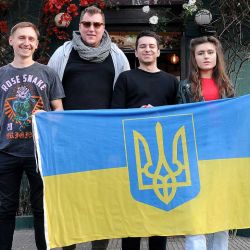

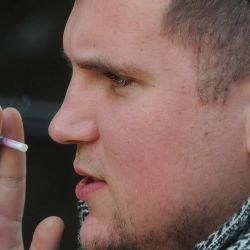

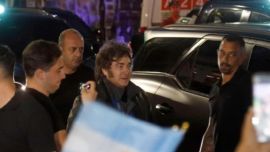










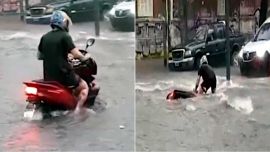
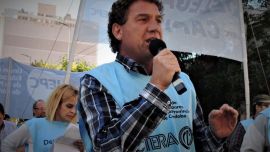

Comments